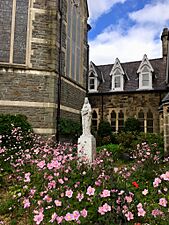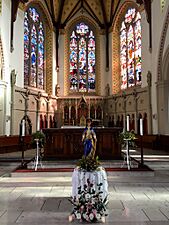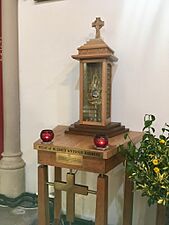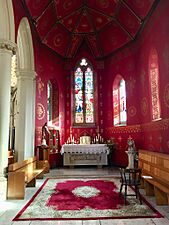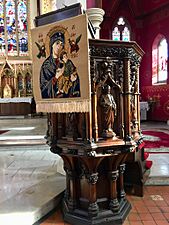St Peter's Church, Roath facts for kids
Quick facts for kids St Peter's Church |
|
|---|---|
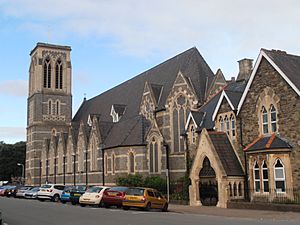
St. Peter's Church, as viewed looking down St. Peter's Street, Plasnewydd
|
|
| 51°29′12″N 3°10′06″W / 51.4868°N 3.1684°W | |
| Denomination | Roman Catholic |
| Website | https://www.stpeters-roath.co.uk/ |
| History | |
| Status | active |
| Founded | 1858 |
| Dedication | St Peter |
| Consecrated | 28 June 1948 |
| Architecture | |
| Heritage designation | Grade II* |
| Designated | 19 May 1975 |
| Architect(s) | Charles Hansom |
| Architectural type | Gothic Revival |
| Style | Geometrical |
| Groundbreaking | 1858 |
| Completed | 1883 |
| Specifications | |
| Capacity | 1000 |
| Number of floors | 2 |
| Materials | Pennant sandstone, Bath stone, Radyr stone |
| Bells | 14 |
| Administration | |
| Parish | St Peter in Roath |
| Deanery | Cardiff |
| Archdiocese | Cardiff-Menevia |
| Province | Cardiff-Menevia |
St Peter's Church in Roath is the oldest Roman Catholic church still standing in Cardiff. Cardiff is the capital city of Wales. This church is managed by a group called the Rosminians.
Contents
The Story of St Peter's Church
When the Rosminians first came to Cardiff in 1854, many Roman Catholics lived there. However, there was only one place for them to worship. This was St David's chapel in the town centre.
Building the Church
In 1858, a piece of land was found near City Road. It was rented for 999 years. Money was raised to build the church. People in the area did not want a Catholic church on a main street. So, plans to extend East Grove were changed.
Charles Hansom designed the first church in 1860. It was meant to have a tall tower and a spire. But these plans were too big for the money they had. When the church opened in 1861, it did not have a tower or a spire.
Early Challenges and Growth
Life was hard for St Peter's Church at first. The area had a lot of poverty. It was also far from where most Catholics lived. This made it difficult for the early priests. Not many people came to church services.
Things started to get better after 1868. This was when John Crichton-Stuart, 3rd Marquess of Bute, became Catholic. A big fundraising effort also helped. A school was started in 1872. A house for the priests, called a presbytery, was also added. It was designed in the Gothic Revival style.
In 1883, the tower was finally built. Lord Bute paid for it. The planned spire was never added. The beautiful stained glass windows in the main worship area were put in during 1882. A statue of Saint Peter was placed above the church entrance in 1912. Extra windows were added to the roof in 1926.
World War II and Beyond
During World War II, the main Cathedral in the city centre was badly damaged. This happened during an air raid in 1941. Because of this, important church events moved to St Peter's between 1941 and 1945.
St Peter's Church was also hit by a bomb. Its roof was badly damaged. This damage was later fixed. The church was officially dedicated in 1948. This happened after all its building debts were paid off. A parish hall was built in 1955. In 1975, the church became a Grade II* listed building. This means it is a very important historic building.
The school moved to a new place in 1977. The old school building was taken down in 1981.
Between 1970 and 1987, Father Gil Jones was the priest at St Peter's. He welcomed Pope John Paul II to Cardiff on April 2, 1982. The church was fully redecorated in 2001.
Church Organs
The first organ at St Peter's was built by Thompson and Shackell. It was rebuilt in 1963 by R.V. Gill.
In 2004, Sir Julian Hodge left a large gift in his will. This money helped to install a new organ. It was named in his honour. This new organ was built by a Swiss company called Späth Orgelbau. It was finished in 2006. The first concert on the new organ was given by Dame Gillian Weir on November 4, 2006.
Gallery
-
Relics of Antonio Rosmini and Pope John Paul II


